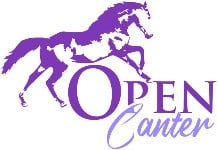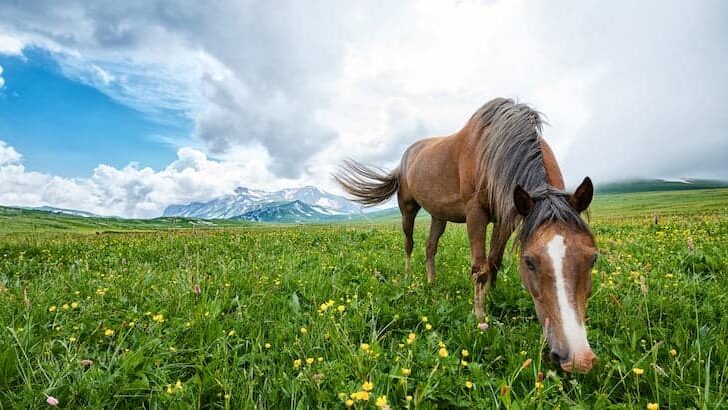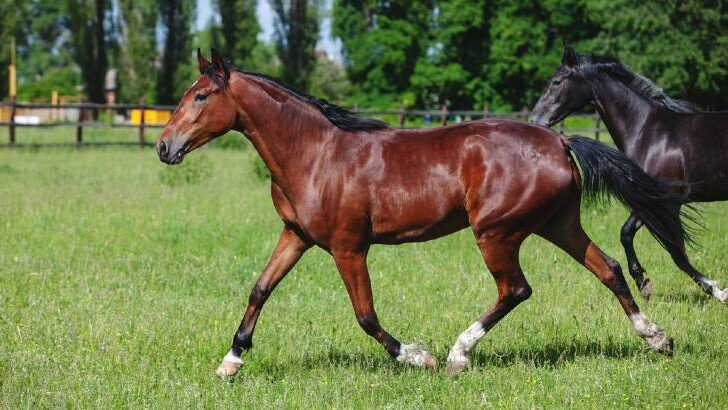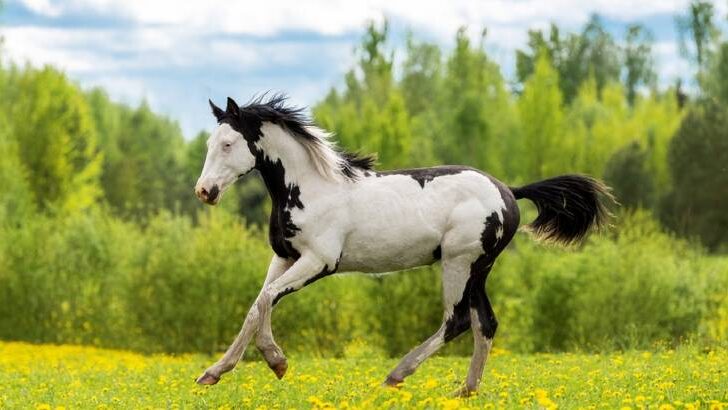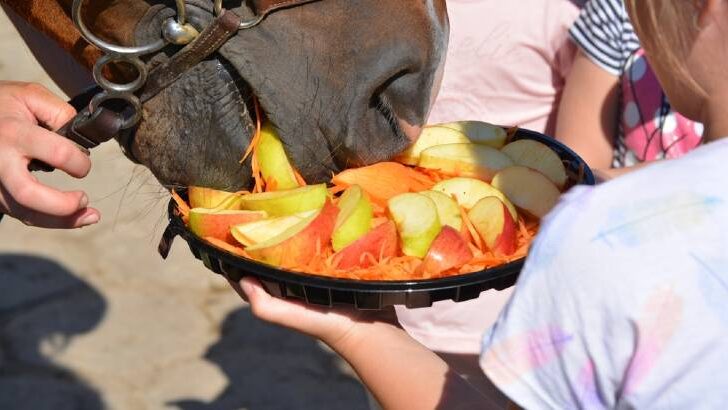Affiliate Disclaimer
As an Amazon Associate I earn from qualifying purchases. It helps me keep the website going. Thank you for your support.
Some horses windsuck throughout the day and others windsuck now and again. And some horses only engage in windsucking after eating. Windsucking after food is such a specific behavior, that often leaves owners scratching their heads in puzzlement. Why is it that some horses windsuck specifically after they have eaten?
Sometimes windsucking after eating can be an indication that your horse has gastric ulcers. At other times, it is an indication of discomfort without the presence of ulcers. Horses can also windsuck at specific times out of habit. And your horse might windsuck with anticipation at the thought of eating.
As you can see there are a number of reasons why your horse might be windsucking after food. Figuring out why yours is relying on this behavior is a matter of trial and error. So, let’s take a look at some of the reasons food can be a trigger for some horses to windsuck.
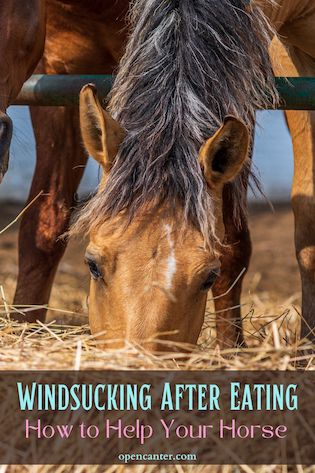
Windsucking After Eating – Stomach Ulcers?
It’s known that there is a connection between windsucking and gastric ulcers. However, the link is not a straightforward one-way connection. It’s thought that windsucking can cause stomach ulcers. But equally, horses can engage in windsucking as a way of alleviating the pain of a stomach ulcer.
To understand how windsucking and ulcers are connected, we need an understanding of how the horse’s digestive system works…
Digestion and Equine Gastric Ulcers
A horse’s stomach produces strong stomach acid 24 hours a day regardless of whether they are eating or not.
The strong acid is designed to break down fibrous food, and also to kill bacteria and germs that may have been eaten.
Unlike the human stomach, an equine stomach can be divided into two sections. These sections are the upper and the lower half. The lining on the upper portion of the horse’s stomach extends from the esophagus into the stomach. This lining is non-glandular.
The lining in the lower half of the horse’s stomach has glandular. This is where stomach acid is produced.
The lining of the upper portion of the stomach is delicate, and vulnerable to strong stomach acid. However, when a horse eats, it produces saliva and saliva contains bicarbonate which is alkaline.
It’s important for horses to eat regularly throughout the day to promote the production of saliva. Regular grazing is one way to ensure that the stomach is protected by alkaline saliva.
If a horse’s stomach is left empty for too long, the delicate lining of the upper stomach can be damaged. Often stomach ulcers will form in the area of the stomach where the upper portion meets the lower portion.
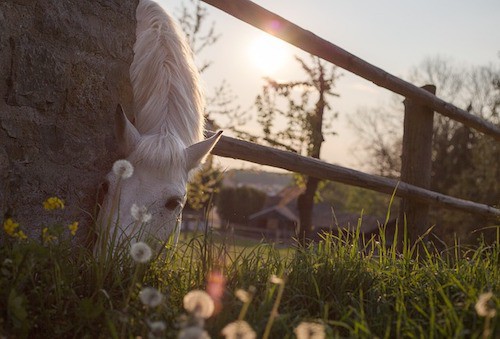
Types of Feed
Certain types of horse food have a higher acid content than others. And particular horse feed will promote the production of more stomach acid than others.
It’s generally accepted that grains, often referred to as ‘cereals’ or ‘cereal grains’ are not recommended for horses with ulcers.
Vets will also often discourage owners from feeding their horses carbohydrate-rich cereals if ulcers are suspected or diagnosed.
There are a few reasons for this:
- Feeding a horse a couple of times a day on cereal leaves the horse’s stomach empty for long periods.
- Horse stomachs produce more acid to digest cereals. When grains are digested, they produce volatile fatty acids that are linked to the development of ulcers (source).
- Cereals require less chewing than other sources of nutrition. When a horse chews less they produce less alkaline saliva to protect the stomach lining.
It’s also worth discussing with your vet what kind of forage to feed your horse.
Some owners find that their horse does better with regular hay instead of haylage. Haylage is a particular type of grass that is cut earlier on when it is being grown.
It is then fermented, and the fermentation process makes haylage more acidic than regular hay. As a result, haylage is sometimes seen as being unsuitable for horses with gastric issues.
On the other hand, it’s sometimes thought that haylage is better for horses with gastric issues because it has a consistency and texture closer to grass.
To further complicate the picture, there is some research suggests that there is no difference between hay and haylage in the incidence of ulcers in horses (source).
Windsucking as a Cause of Equine Gastric Ulcers
So how does this connect to windsucking after eating? Let’s take a look at that connection now…
The action of windsucking involves the horse flexing its neck and then using the stomach muscles to suck in the air. This is accompanied by a grunting noise that is familiar to anyone who owns a windsucking horse.
Windsucking can cause ulcers for the following reasons:
- As the horse windsucks they are drawing air into their stomach. One consequence of this is that they fill their belly with air. This can discourage them from eating as much as they need to. This is one of the reasons why horses who windsuck lose weight, and are often thought of as being ‘poor doers’.
- The more time the horse spends engaging in repetitive behavior like windsucking the less time they spend grazing. This too can result in a horse’s stomach being empty longer than it should be.
- Horses that windsuck are not chewing as much as they ought, and are therefore producing less saliva.
- Additionally, the stomach lining is not protected by the fibrous content provided by forage.
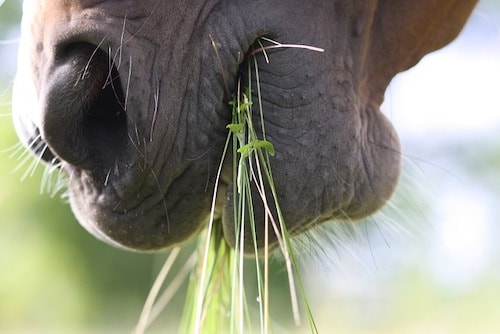
Windsucking as a Symptom of Equine Gastric Ulcers
It’s also thought that windsucking can be an indication that the horse is suffering from the discomfort of gastric ulcers.
Windsucking can play a part in the development of gastric ulcers. But equally, there is some thinking that horses develop vices to cope with the pain of ulcers.
There are a number of reasons why horses start windsucking. It’s known that there is a hereditary component to developing this stereotypic behavior. However, it’s also known to be a way that horses cope with stress. You can read more about the causes of windsucking here.
If a horse is feeling stressed by stomach pain, it may deal with this by developing habits such as windsucking.
A horse that is windsucking after eating may be trying to deal with the stressful discomfort of a stomach ulcer.
What To Do If You Are Concerned That Your Horse Has a Stomach Ulcer?
If you suspect that your horse has a stomach ulcer, you can arrange an endoscope with your vet. This is often called ‘scoping’.
During a scoping procedure, a video camera is passed through the horse’s nose, down the esophagus, and into the stomach. The horse is sedated during the procedure, which takes around 10- 20 minutes.
The vet inspects the stomach with the camera and will grade any damage to the stomach lining. Ulcers will be graded on a scale of 0 to 4, with 4 being the most significant ulcers that are bleeding.
Getting scoped is expensive, and it is not always the first thing owners will try. Many opt for trying out more conservative measures first. These might include changing the horse’s diet or trying supplements and medication. We will look a little closer at diet and supplements later.
But what happens if your horse is scoped and given the all-clear? It’s great that your horse doesn’t have ulcers, but if they don’t have ulcers, why are they windsucking after eating?
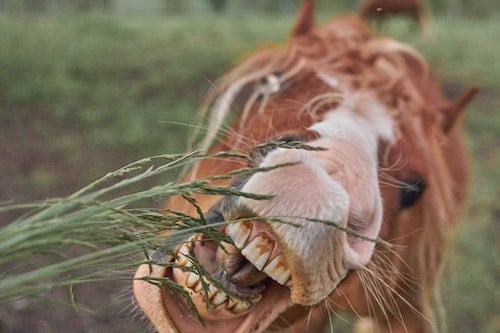
Other Reasons Why Your Horse is Windsucking After Eating
Here are some possible explanations…
Formed Associations:
Some horses are fast learners and will form a strong associations quickly. It’s possible that at some point your horse has had an experience of eating, followed by stomach discomfort.
If they found that windsucking offered them some relief on a few occasions, they might simply develop the habit. Eating might become associated in their mind with the relief of windsucking.
So, although subsequent feeds may not be uncomfortable, windsucking might be associated in their mind with a positive experience.
Windsucking is known to release endorphins into the horse’s bloodstream. Endorphins are stress hormones that make the horse feel good (source).
Horses can form habits around endorphin-releasing behavior in the same way that humans do. Once an association of this kind is formed, it’s hard to break, for horses and humans!
Dealing With Stress, Excitement, and Anticipation
Because windsucking releases feel-good hormones into the horse’s body, they use it as a form of stress relief.
That is why there is a higher incidence of windsucking when horses are stabled. Being in a stable can be stressful for horses, and windsucking is a way of dealing with this.
As experiences go, stress, excitement and anticipation are closely related. They each involve a rise in cortisol and adrenalin in the bloodstream (source). These are the stress hormones that create that ‘on edge’ fight/flight experience.
When horses are stressed, they have an elevated level of cortisol (source). Horses windsuck to generate feel-good hormones to counteract stress hormones that make them feel edgy. This is most likely why some horses windsuck before they are fed.
They may hear their meal being prepared, see the bucket appear, and know that food is on its way. Some windsuck when they know they’re going to be fed. As such, windsucking is more of a way of coping with anticipation and excitement.
Diet
Not all stomach discomfort is caused by the presence of ulcers. Much like humans experiencing the discomfort of acid reflux, high levels of acid can cause discomfort for horses.
It is worth considering whether your horse’s diet is causing elevated stomach acid. These are some useful questions to consider…
- Are they eating regularly enough?
- Do they have enough forage to keep them chewing throughout the day?
- Is the type of food they are eating contributing to higher stomach acid levels?
It is sometimes found that natural products such as aloe vera juice can have a soothing effect on your horse’s gut. Alfalfa has a high protein and calcium content and is thought to act as a good barrier to stomach acid.
As mentioned above, it’s best to discuss any changes with your vet. You may decide to adjust your horse’s diet to see if that makes a difference to windsucking after eating.
When you make changes to a horse’s diet, this should be done gradually over 7 to 10 days. Sudden changes in a horse’s diet can cause colic.
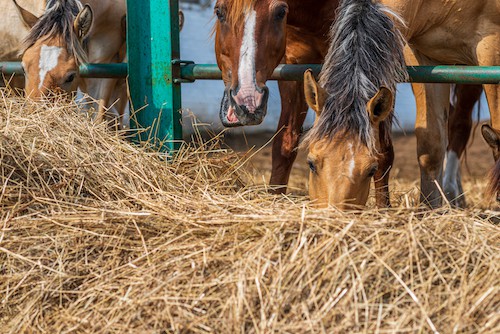
Other Ways to Help Your Horse
Windsucking is a hard habit to break. However, there are some techniques that you can try that can make a difference:
Use of dietary supplements – Some dietary supplements can help prevent gastric acid in horses. An example is Corta-Flx U-Gard Pellets and Coligone.
Medication– Two medications for gastric acid are approved by the FDA. One is called GastroGard. This can be prescribed by your vet and is designed to treat equine gastric ulcers. It contains omeprazole.
UlcerGard also contains omeprazole, but it is designed to prevent the development of ulcers. It’s a non-prescription, over-the-counter drug. The difference between GastroGard and UlcerGard is in the dose of omeprazole that they deliver.
Sufficient Stimulation– Turn your horse out as much as you are able to. This will help avoid the stress-inducing boredom and isolation that horses can experience in the stable.
Final Thoughts
It can be very unsettling to see your horse engaging in habitual behavior like windsucking or cribbing. Naturally, you want to help them and figure out what is prompting them to rely on a vice.
As you will have seen windsucking after eating can be caused by a few factors. Some of these factors are more serious for your horse’s well-being than others. It’s good to take a systematic approach to figure out what’s going on and discuss your concerns with your vet.
